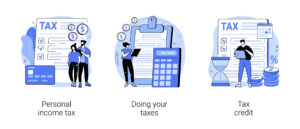How to Minimize Investment Taxes

How to Minimize Investment Taxes
As an investor, your first priorities should be 1) to develop an asset allocation strategy that aligns with your investment objectives and risk profile, and 2) to select quality securities that support that strategy. Only after that’s done should you turn your attention to taxes and identify opportunities to improve the tax-efficiency of your portfolio.
Here are several planning strategies to consider:
• Make the most of tax-advantaged accounts. Evaluate the tax-efficiency of each investment, based on factors such as dividend yields, fund turnover, and expected growth. To the extent possible, tax-efficient investments should be held in taxable accounts. Tax-inefficient investments should be held in tax-advantaged accounts, such as traditional or Roth IRAs, qualified retirement accounts, or education savings accounts. Tax-advantaged accounts may also offer opportunities to rebalance your portfolio tax-efficiently by containing asset turnover, to the extent possible, within those accounts.
• Consider tax-efficient options. Examine investment alternatives that offer similar benefits in a more tax-efficient structure. For example, exchange traded funds (ETFs) typically generate fewer taxable gains than comparable mutual funds, and index funds tend to be more tax-efficient than actively managed funds.
• Analyze tax-exempt investments. Consider tax-exempt investments, such as municipal bonds. But be sure to calculate the tax-equivalent yield to determine whether the tax savings compensate for reduced returns.
• Harvest losses. Throughout the year, consider selling poor-performing investments to generate losses that can be used to offset capital gains (plus up to $3,000 of ordinary income). You can even buy the investments back, so long as you wait at least 31 days to avoid the wash sale rule.
• Watch out for short-term gains. Gains on investments held less than a year are generally taxed as ordinary income and may also be subject to the 3.8% net investment income (NII) tax. There are several potential strategies for minimizing these taxes, including holding these investments for at least one year, harvesting losses to offset short-term gains, and limiting short-term gains (if possible) to tax-advantaged accounts.
• Pay attention to basis. If you buy shares of stock or mutual funds at different times, you can minimize your gains when you sell a portion of your shares by selling the shares with the highest cost basis. To do that, you need to use the “specific identification method” and inform your broker which shares you wish to sell. If you don’t, the IRS will apply the first-in, first-out (FIFO) method, which often results in the lowest-basis shares being sold first, generating higher capital gains.
• Avoid year-end mutual fund purchases. This is a common tax trap. Generally, mutual funds distribute capital gains and other income near the end of the year. If you invest in these funds shortly before the record date, you’ll be taxed on these distributions as if you had held the funds all year.
Tax season is an ideal time to consider these issues. An examination of your investment-related taxes for 2016 can reveal tax-saving opportunities for 2017.
We hope you found this article about “How to Minimize Investment Taxes” helpful. If you have questions or need expert tax or family office advice that’s refreshingly objective (we never sell investments), please contact us or visit our Family office page or our website at www.GROCO.com. Unfortunately, we no longer give advice to other tax professionals gratis.
To receive our free newsletter, contact us here.
Subscribe to our YouTube Channel for more updates.

Alan Olsen, is the Host of the American Dreams Show and the Managing Partner of GROCO.com. GROCO is a premier family office and tax advisory firm located in the San Francisco Bay area serving clients all over the world.
Alan L. Olsen, CPA, Wikipedia Bio

GROCO.com is a proud sponsor of The American Dreams Show.

The American Dreams show was the brainchild of Alan Olsen, CPA, MBA. It was originally created to fill a specific need; often inexperienced entrepreneurs lacked basic information about raising capital and how to successfully start a business.
Alan sincerely wanted to respond to the many requests from aspiring entrepreneurs asking for the information and introductions they needed. But he had to find a way to help in which his venture capital clients and friends would not mind.
The American Dreams show became the solution, first as a radio show and now with YouTube videos as well. Always respectful of interview guest’s time, he’s able to give access to individuals information and inspiration previously inaccessible to the first-time entrepreneurs who need it most.
They can listen to venture capitalists and successful business people explain first-hand, how they got to where they are, how to start a company, how to overcome challenges, how they see the future evolving, opportunities, work-life balance and so much more..
American Dreams discusses many topics from some of the world’s most successful individuals about their secrets to life’s success. Topics from guest have included:
Creating purpose in life / Building a foundation for their life / Solving problems / Finding fulfillment through philanthropy and service / Becoming self-reliant / Enhancing effective leadership / Balancing family and work…

MyPaths.com (Also sponsored by GROCO) provides free access to content and world-class entrepreneurs, influencers and thought leaders’ personal success stories. To help you find your path in life to true, sustainable success & happiness. It’s mission statement:
In an increasingly complex and difficult world, we hope to help you find your personal path in life and build a strong foundation by learning how others found success and happiness. True and sustainable success and happiness are different for each one of us but possible, often despite significant challenges.
Our mission at MyPaths.com is to provide resources and firsthand accounts of how others found their paths in life, so you can do the same.
IRS Notice 2009-62 Issued 8/7/09
IRS Notice 2009-62 Issued 8/7/09 The due date for reporting the existence of Offshore Bank Accounts on Treasury Department Form TD F 90-22.1 has been an issue of great confusion in the last few months. Form TD F 90-22.1 is known as Foreign Bank Account Reporting (AKA “FBAR”) For a complete review of this soap…
Income the IRS Can’t Touch
Income the IRS Can’t Touch There’s one readily available and legal source of untaxed income that we know of: municipal bonds. These securities are issued by state and local governments, school districts, hospitals and other public agencies to support community projects and services. To permit these worthy endeavors to raise money economically, Uncle Sam exempts…
Avoiding Real Estate Tax Revaluations
Avoiding Real Estate Tax Revaluations by Steven Singer, CPA As a result of the passage of Proposition 13 almost thirty years ago, real estate owners currently enjoy paying property taxes based on the property’s purchase price, value of improvements and an annual increase of 2% over the previous years’ assessed value. As a result of…
Annuities in Qualified Retirement Plans
Annuities in Qualified Retirement Plans By Russell Hill Using annuities in qualified retirement plans. Qualified annuities reduce your current taxable salary in addition to accumulating tax deferred earnings, when you contribute money to an annuities program through an employer (as one of the investment options in a salary reduction retirement plan). Those who work for…


